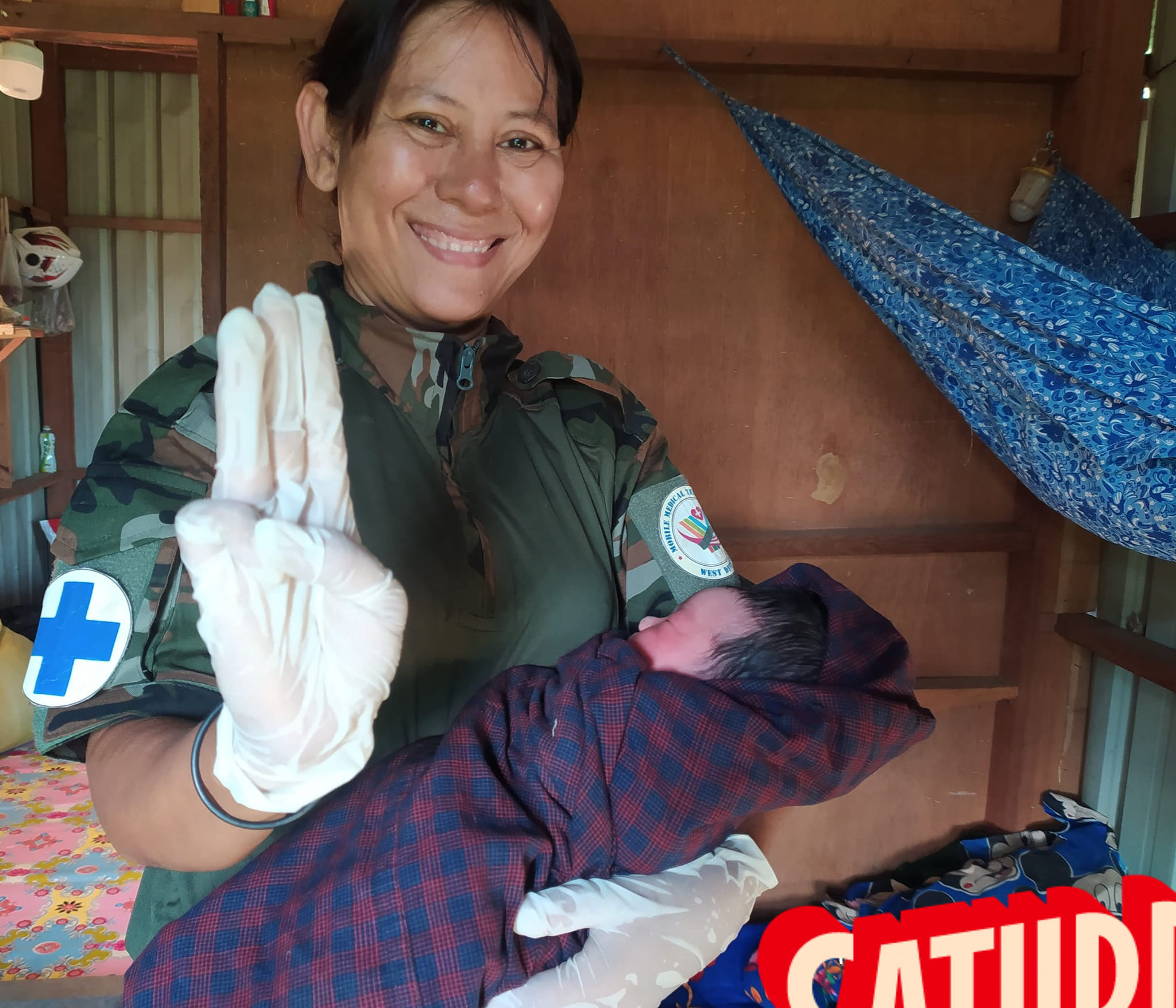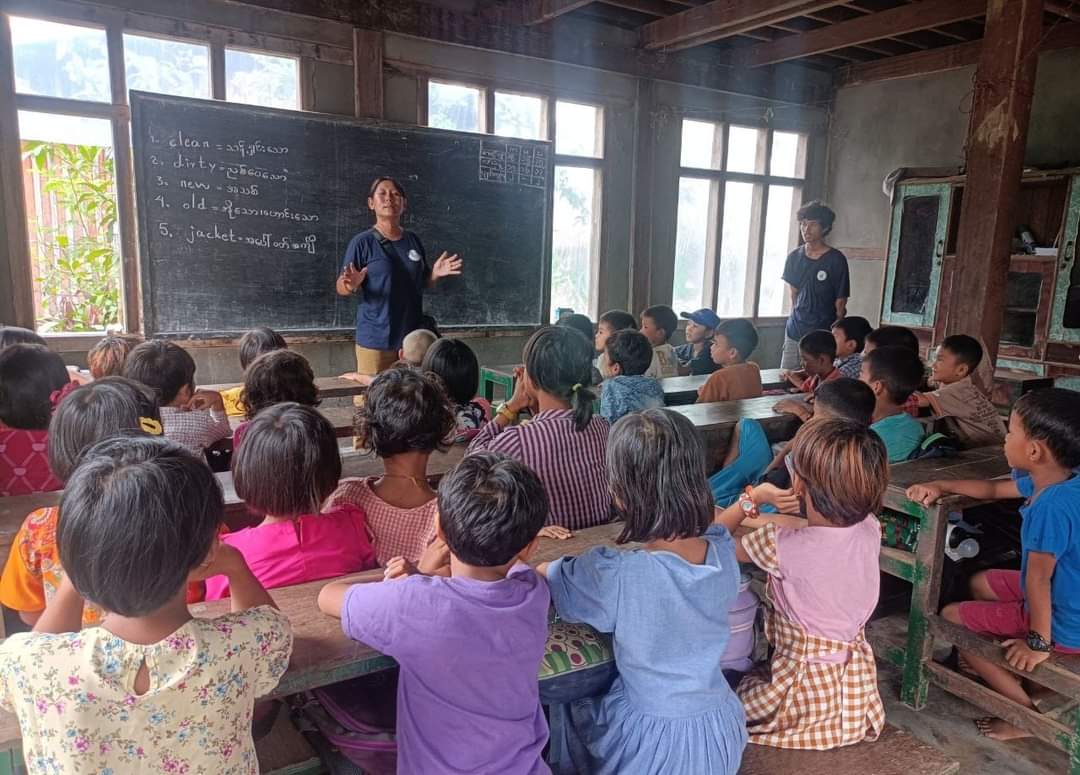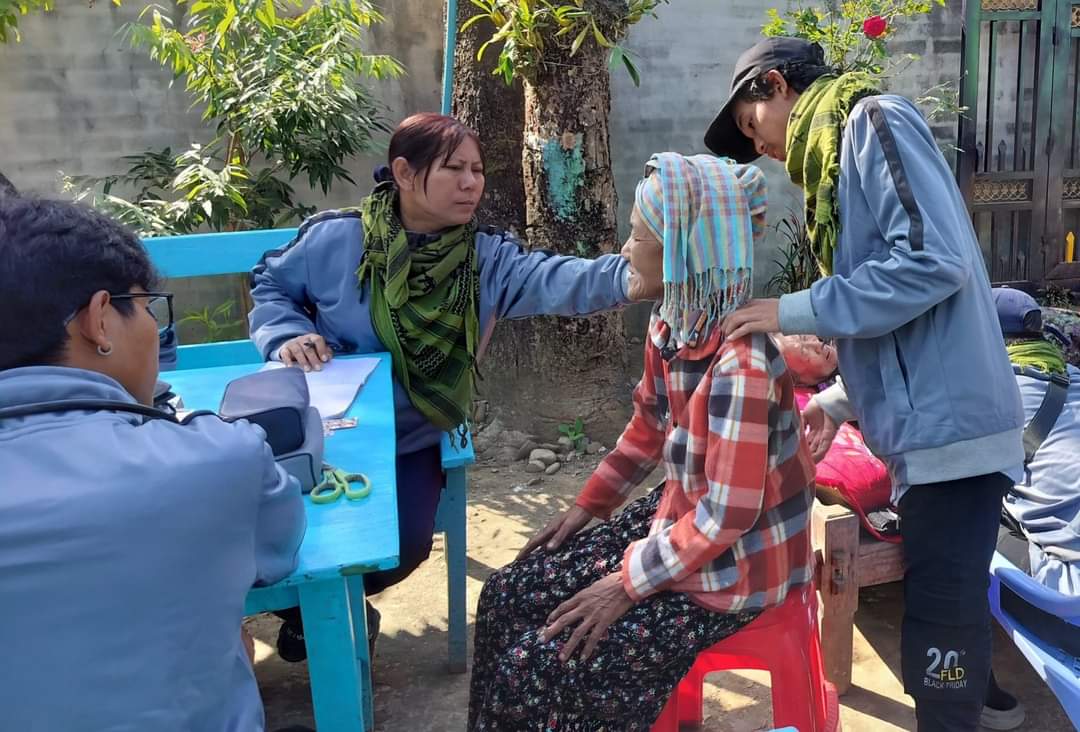Revolutionary Stories: Teacher Turned Midwife Delivering Hope on Myanmar’s Frontline

As the roar of artillery echoed outside, the people in the house, including Daw Radi Ohm, were oblivious. A dozen people were gathered around the pregnant woman, pain mounting as she entered her 15th hour in labor. Daw Radi Ohm was focused on one thing: delivering the baby as soon as possible. Anxiety was high and rising; this was the first time she had attended a birth.
Two hours later, Daw Radi Ohm successfully delivered the baby, drawing on her childhood experiences as the daughter of a midwife and advice from an obstetrician over the phone. However, the intense excitement and worry of that moment will never leave her. Tragically, the baby’s father, a sub-commander of a People’s Defense Force group, was killed in a clash with junta troops soon after
“There was fighting in Southern Kale amid the earliest battles of the Spring Revolution. We had to take a car and boat to reach the pregnant woman’s house. We posted a lookout team at the corner of the street,” said Daw Radi Ohm, recounting her first experience delivering a baby three years ago.
Obstetrics was completely unknown to Daw Radi Ohm, a lecturer in her 40s at the Government Technical High School (Kale), Sagaing Region. However, she boldly took up the challenge as a revolutionary medic three years ago, after the military overthrew the democratically elected government.

Daw Radi Ohm has swapped the classroom for the conflict zone in Sagaing, nurturing new life in the face of a brutal junta onslaught on communities.
Beginning of her revolutionary journey
As a volunteer monitoring preparations for the 2020 election, she refused to accept the military’s allegation of voting fraud. She had visited villages across southern Kale Township for a voter awareness campaign. She also observed the advance vote count as head of Kale’s Htoma village polling committee.
“That’s why we could not accept a military coup staged on the pretext of voting fraud,” Daw Radi Ohm said.
Dismayed that the February 1, 2021 putsch had stolen the promise of a brighter future under an elected government, especially after the hardships of Covid-19, she quit her job.
She joined the civil disobedience movement (CDM) the very next day.
“We do not want to be governed by any government other than the one we voted for. Therefore, I joined the revolution,” said Daw Radi Ohm from Tamu, where she and her team provide health awareness and treatment for internally displaced people (IDPs).
She joined anti-coup protests and, on March 27, formed a mobile medical team. The team of CDM health workers treated protesters injured in the violent crackdown. It operated in “Fort Tahan”, a protest camp built from sandbags and bricks to shield anti-coup demonstrators from the bullets of police and soldiers.
On April 7, junta forces attacked and destroyed the camp, killing a dozen protesters.
“We had no weapons at that time. We realized we would have to kick off the dog [military] that was running to bite us,” she said.
Daw Radi Ohm and other protesters left Kale and joined military training under an ethnic armed force. However, she eventually decided to support the revolution peacefully, helping communities on the ground.
In Sagaing, over 1.1 million people have been displaced by fighting and junta clearance operations, airstrikes, arson and artillery attacks, according to a report issued by the United Nations Office for the Coordination of Humanitarian Affairs (UNOCHA) in March.
“Alongside armed struggle, we need sectors like education, health and administration to support the revolution. Healthcare cannot take a backseat,” said Daw Radi Ohm, explaining why she chose the health sector.

Daw Radi Ohm smiles while holding a newborn she has just delivered in 2023.
From engineering teacher to midwife
She currently leads the 50-strong Mobile Medical Team-West Division, providing medical support and health awareness activities for IDPs. Since 2021, the team has expanded beyond Kale to cover the neighboring Sagaing townships of Mingin and Kalewa.
All the while, Daw Radi Ohm has been working under instruction from CDM doctors as well as attending online courses to boost her medical knowledge. Her focus is healthcare for pregnant women and children under five years old.
“Although I am an engineer, my mother is a holistic health practitioner and midwife. Since childhood, I’ve heard about my mother’s experience of delivering babies. So, now I am providing care to pregnant women while studying the subject,” she said.
As a midwife, she has been faced with emergency situations.
“On one occasion, a baby was born at 9 pm but the placenta remained in the womb. With no phone connection available, I sped off on a motorbike to a place 10 minutes away to reach the doctors. I followed their instructions and the placenta was eventually delivered after three hours.”
She has now delivered a total of 25 babies for the wives of resistance fighters and displaced civilians.
Her team is funded by donations from well-wishers both at home and abroad. The main difficulty for the team is sourcing medicines. The military also has blocked routes and delivery of medical supplies in resistance strongholds such as Sagaing Region and Kayah, Chin and Rakhine states.
However, the team has found ways to bypass the blockade.
We collect medicine in all kinds of ways,” Daw Radi Ohm said.
The team also provides basic training for IDPs in welding, engine repair, basket weaving, cookery and tailoring.
But despite her community-based activities, Daw Radi Ohm remains connected to the armed struggle.
“Whenever there are clashes, we always accompany [the PDF] as a medical unit,” she said.
 Giving a lesson in health awareness to children in June.
Giving a lesson in health awareness to children in June.
A medic amid battle
Daw Radi Ohm admits to being frightened when she first experienced frontline battle as a medic. However, her fear vanished as soon as she began treating wounded young comrades.
“It triggered mental strength that I didn’t had before, seeing the youths fight and get hurt,” Daw Radi Ohm said.
She recalled an occasion when she came face to face with junta soldiers while trying to retrieve a wounded PDF member during a clash in southern Kale. Fortunately, she managed to avoid being shot.
Although she escaped death, she has lost several of her students and comrades during the revolution. She broke down in tears as she spoke about Ko Dimo, lieutenant commander of the PDF-Kalay Mine Force, who was killed in a fight in Kale town in May.
She said he had looked after her like a mother while they were protesting in Tahan, Kale in 2021.
“They didn’t want to abandon the task [of eradicating military dictatorship] they were carrying, but had to leave their comrades behind. So, we will continue to carry them on our shoulders, “she said, sobbing.

Treating internally displaced people at a camp in Tamu Township, Sagaing in January.
Revolutionary expectations
Daw Radi Ohm said her aim was to return to the classroom after the revolution had rooted out dictatorship. She emphasized that despite the hardships of jungle life, she did not feel weary because she was committed to her chosen path.
“Being able to take pride in myself and my achievements is a rare opportunity,” she said with conviction.
Ma Chit Myat Noe, a representative of the Tamu Region Support Center, hailed Daw Radi Ohm as an inspirational woman, working to support both communities and PDFs on the ground.
During fighting in Khampat town in western Sagaing, Daw Radi Ohm and her team traveled to the front line to retrieve and treat the wounded, she said.
“I respect her. I want to be a woman like her,” Ma Chit Myat Noe said.
Ma Phyu, a former student of Daw Radi Ohm, recalled she was a good teacher and with a kindly manner.
But Daw Radi Ohm has no regrets about giving up her stable life and position for the arduous path of revolution, explaining she had already decided to sacrifice her life for the cause.
“So, I don’t think about the rest anymore,” she said flatly.
In addition to her work in education, health and support in Sagaing Region, where the junta is waging indiscriminate air and artillery attacks, Daw Radi Ohm also frequently challenges the regime via social media.
“You can do whatever you want, but we won’t back down no matter what,” she wrote recently.

